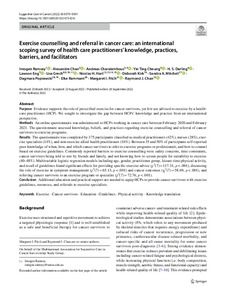Exercise counselling and referral in cancer care: an international scoping survey of health care practitioners' knowledge, practices, barriers, and facilitators
Ramsey Imogen; Chan Alexandre; Charalambous Andreas; Cheung Yin Ting; Darling H. S.; Eng Lawson; Grech Lisa; Hart Nicolas H.; Kirk Deborah; Mitchell Sandra A.; Poprawski Dagmara; Rammant Elke; Fitch Margaret I; Chan Raymond J.
https://urn.fi/URN:NBN:fi-fe2022112967678
Tiivistelmä
Purpose Evidence supports the role of prescribed exercise for cancer survivors, yet few are advised to exercise by a healthcare practitioner (HCP). We sought to investigate the gap between HCPs' knowledge and practice from an international perspective.
Methods An online questionnaire was administered to HCPs working in cancer care between February 2020 and February 2021. The questionnaire assessed knowledge, beliefs, and practices regarding exercise counselling and referral of cancer survivors to exercise programs.
Results The questionnaire was completed by 375 participants classified as medical practitioners (42%), nurses (28%), exercise specialists (14%), and non-exercise allied health practitioners (16%). Between 35 and 50% of participants self-reported poor knowledge of when, how, and which cancer survivors to refer to exercise programs or professionals, and how to counsel based on exercise guidelines. Commonly reported barriers to exercise counselling were safety concerns, time constraints, cancer survivors being told to rest by friends and family, and not knowing how to screen people for suitability to exercise (40-48%). Multivariable logistic regression models including age, gender, practitioner group, leisure-time physical activity, and recall of guidelines found significant effects for providing specific exercise advice (chi(2)(7) = 117.31, p < .001), discussing the role of exercise in symptom management (chi(2)(7) = 65.13, p < .001) and cancer outcomes (chi(2)(7) = 58.69, p < .001), and referring cancer survivors to an exercise program or specialist (chi(2)(7) = 72.76, p < .001).
Conclusion Additional education and practical support are needed to equip HCPs to provide cancer survivors with exercise guidelines, resources, and referrals to exercise specialists.
Kokoelmat
- Rinnakkaistallenteet [29335]
